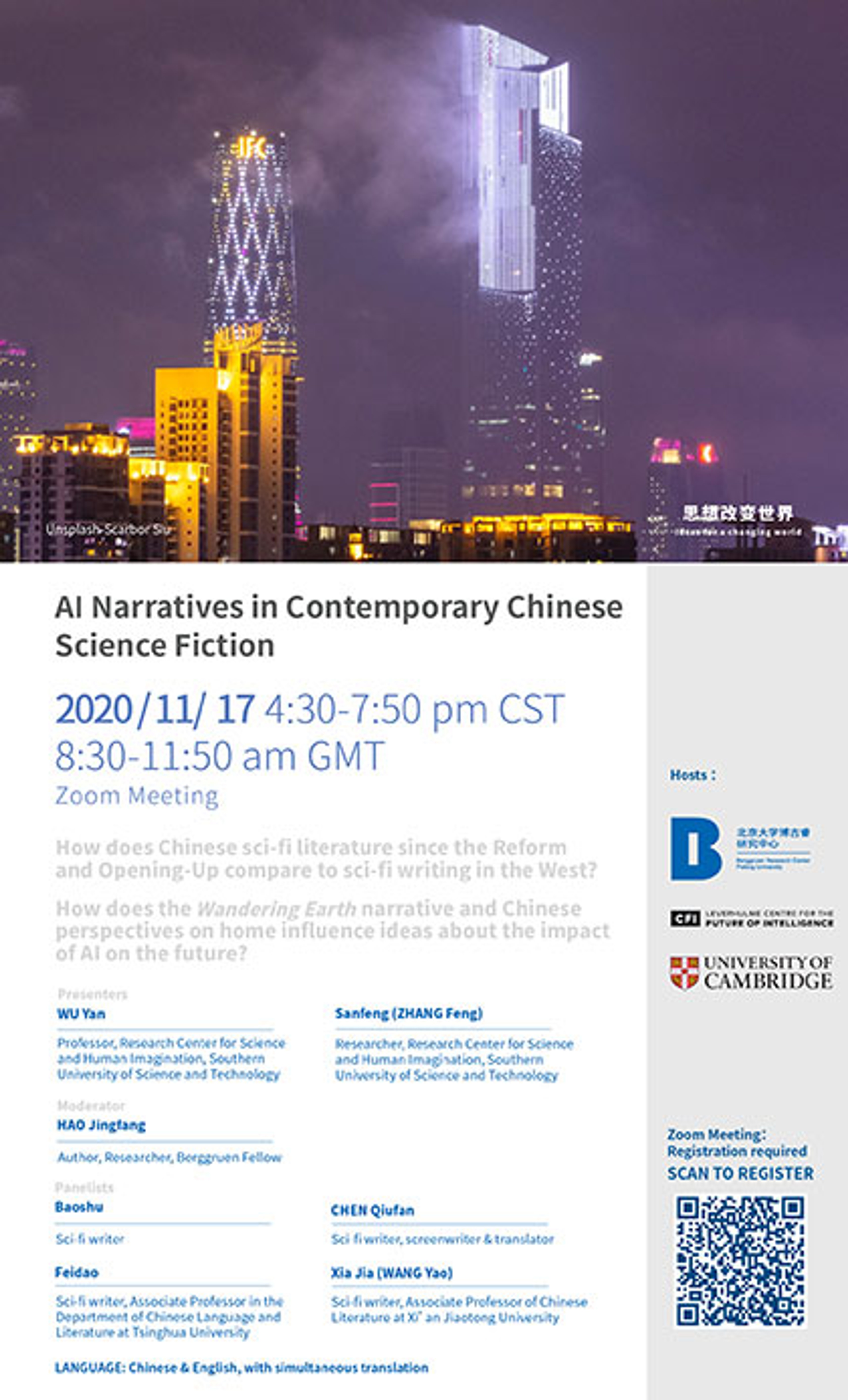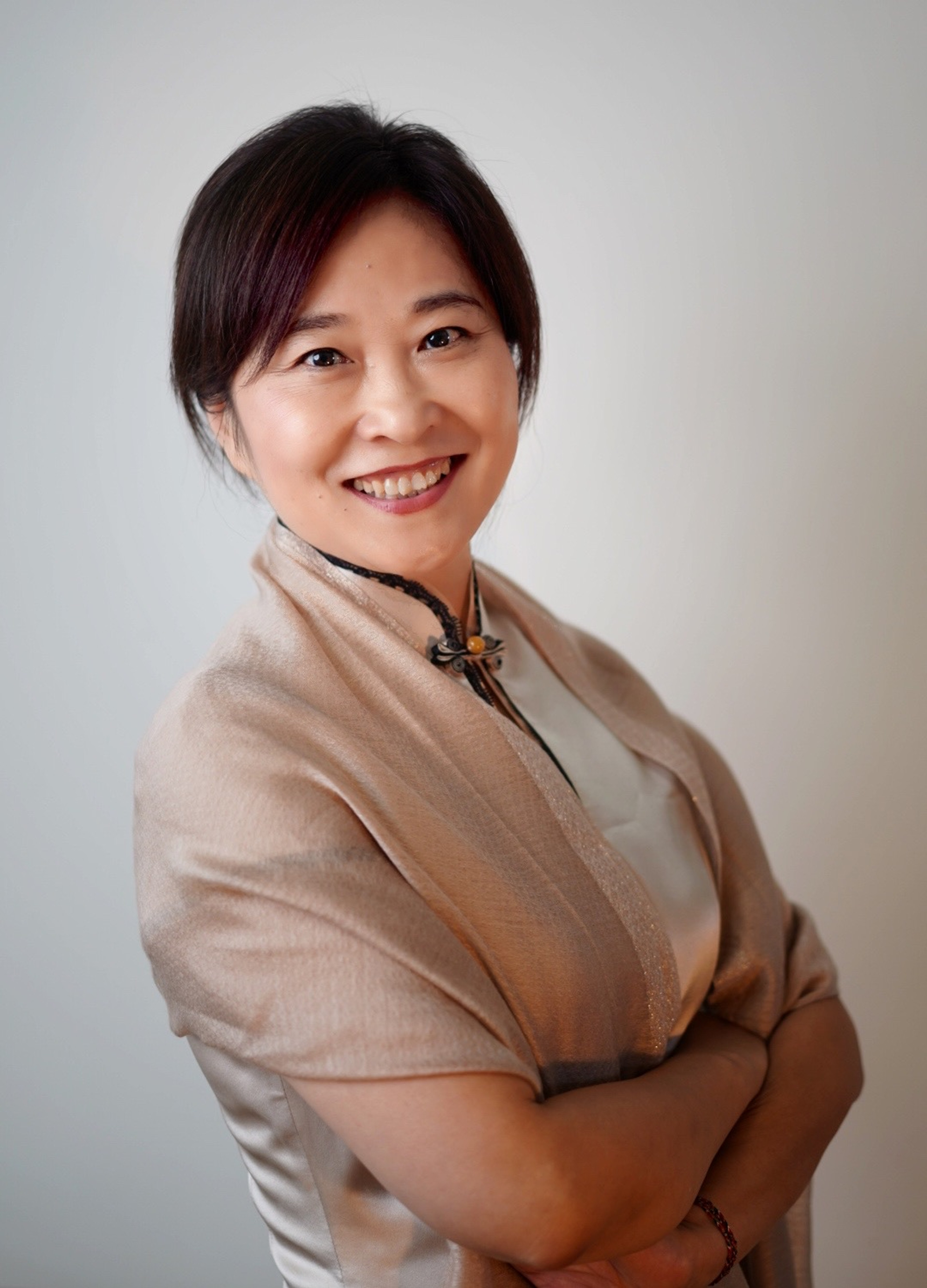AI Narratives in Contemporary Chinese Science Fiction
- Date: November 12, 2020
Platform & Language:
Zoom (Chinese and English, with simultaneous translation)
Click here to register.

Discussion points:
1. How does Chinese sci-fi literature since the Reform and Opening-Up compare to sci-fi writing in the West?
2. How does the Wandering Earth narrative and Chinese perspectives on home influence ideas about the impact of AI on the future
About the Speakers:
WU Yan is a professor and PhD supervisor at the Humanities Center of Southern University of Science and Technology. He is a science fiction writer, vice chairman of the China Science Writers Association, recipient of the Thomas D Clareson Award of the American Science Fiction Research Association, and co-founder of the Xingyun (Nebula) Awards for Global Chinese Science Fiction. He is the author of science fictions such as Adventure of the Soul and The Sixth Day of Life and Death, academic works such as Outline of Science Fiction Literature, and textbooks such as Science and Fantasy – Training Course for Youth Imagination and Scientific Innovation.
Sanfeng is a science fiction researcher, visiting researcher of the Humanities Center of Southern University of Science and Technology, chief researcher of Shenzhen Science & Fantasy Growth Foundation, honorary assistant professor of the University of Hong Kong, Secretary-General of the World Chinese Science Fiction Association, and editor-in-chief of Nebula Science Fiction Review. His research covers the history of Chinese science fiction, development of science fiction industry, science fiction and urban development, science fiction and technological innovation, etc.
About the Event
Keynote 1 “Chinese AI Science Fiction in the Early Period of Reform and Opening-Up (1978-1983)”
(改革开放早期(1978-1983)的中国AI科幻小说)
Abstract: Science fiction on the themes of computers and robots emerged early but in a scattered manner in China. In the stories, the protagonists are largely humanlike assistants chiefly collecting data or doing daily manual labor, and this does not fall in the category of today’s artificial intelligence. Major changes took place after the reform and opening-up in 1978 in this regard. In 1979, the number of robot-themed works ballooned. By 1980, the quality of works also saw a quantum leap, and stories on the nature of artificial intelligence began to appear. At this stage, the AI works such as Spy Case Outside the Pitch, Dulles and Alice, Professor Shalom’s Misconception, and Riot on the Ziwei Island That Shocked the World describe how intelligent robots respond to activities such as adversarial ball games (note that these are not chess games), fully integrate into the daily life of humans, and launch collective riots beyond legal norms under special circumstances. The ideas that the growth of artificial intelligence requires a suitable environment, stable family relationship, social adaptation, etc. are still of important value.
Keynote 2 “Algorithm of the Soul: Narrative of AI in Recent Chinese Science Fiction”
(灵魂的算法:近期中国科幻小说中的AI叙事)
Abstract: As artificial intelligence has been applied to the fields of technology and daily life in the past decade, the AI narrative in Chinese science fiction has also seen seismic changes. On the one hand, young authors are aware that the “soul” of AI comes, to a large extent, from machine learning algorithms. As a result, their works often highlight the existence and implementation of algorithms, bringing maneuverability and credibility to the AI. On the other hand, the authors prefer to focus on the conflicts and contradictions in emotions, ethics, and morality caused by AI that penetrate into human life. If the previous AI-themed science fiction is like a distant robot fable, the recent AI narrative assumes contemporary and practical significance. This report focuses on exploring the AI-themed science fiction by several young authors (including Hao Jingfang’s The Problem of Love and Where Are You, Chen Qiufan’s Image Maker and Algorithm for Life, and Xia Jia’s Let’s Have a Talk and Shejiang, Baoshu’s Little Girl and Shuangchimu’s The Cock Prince, etc.) to delve into the breakthroughs and achievements in AI narratives.
